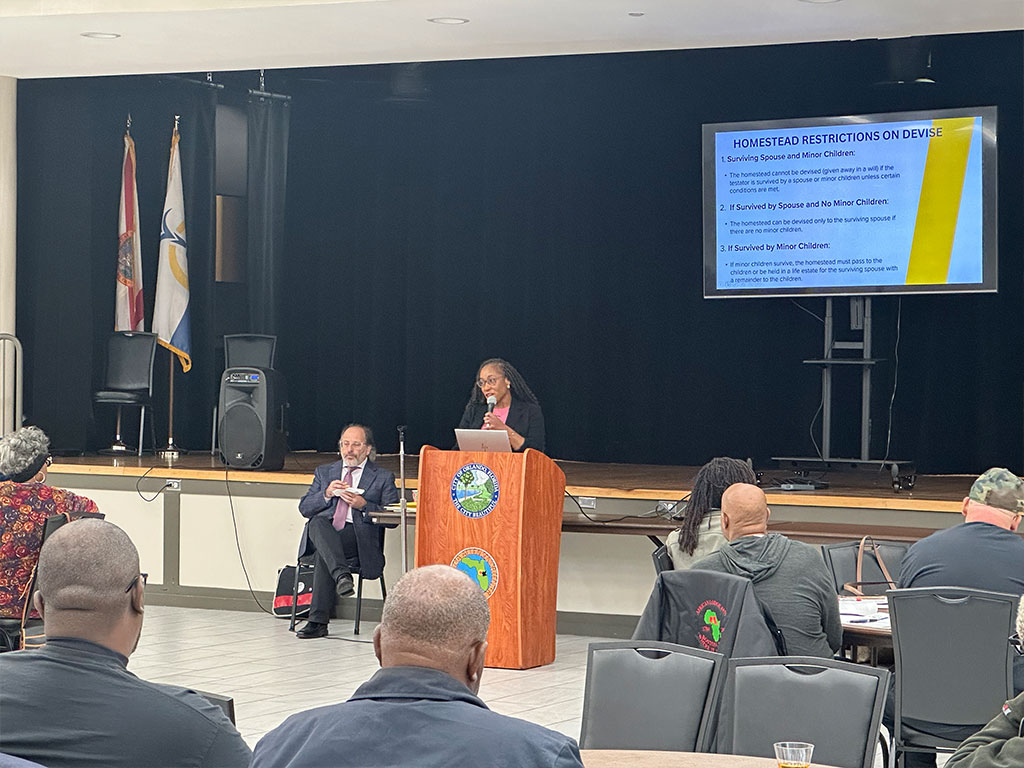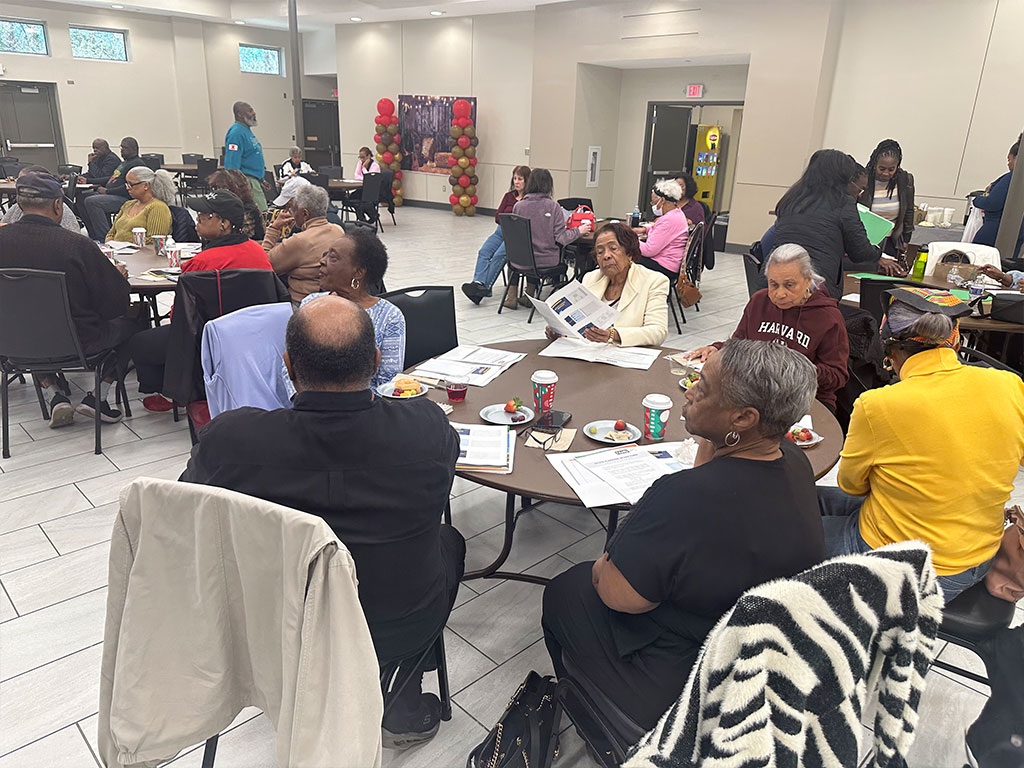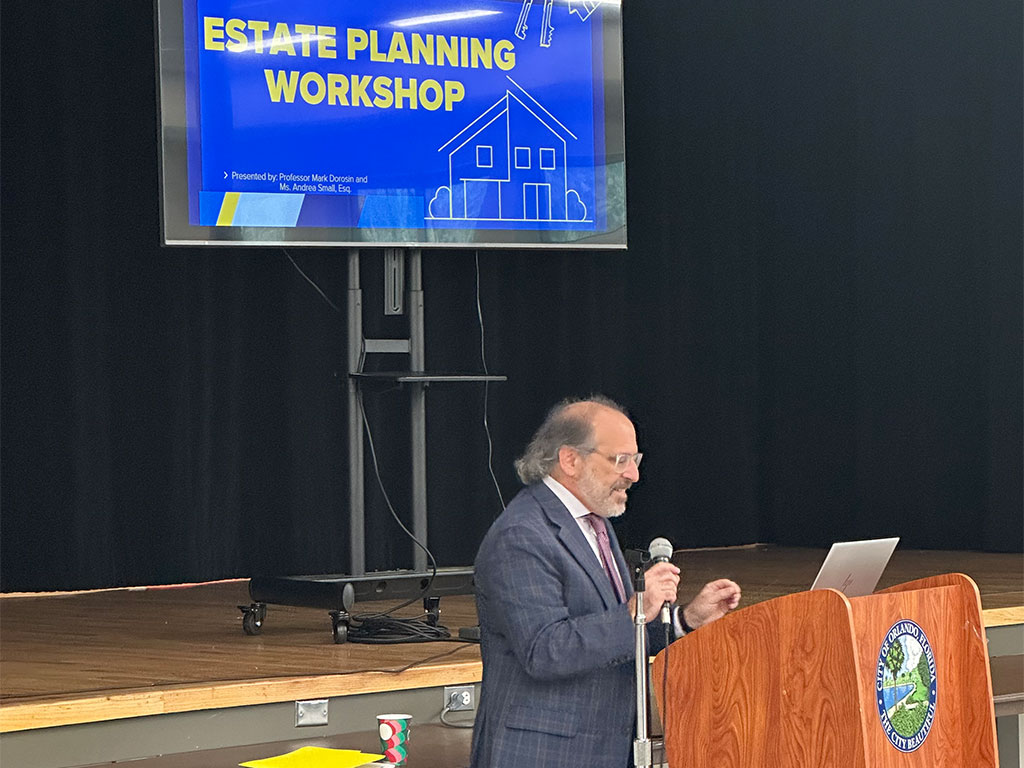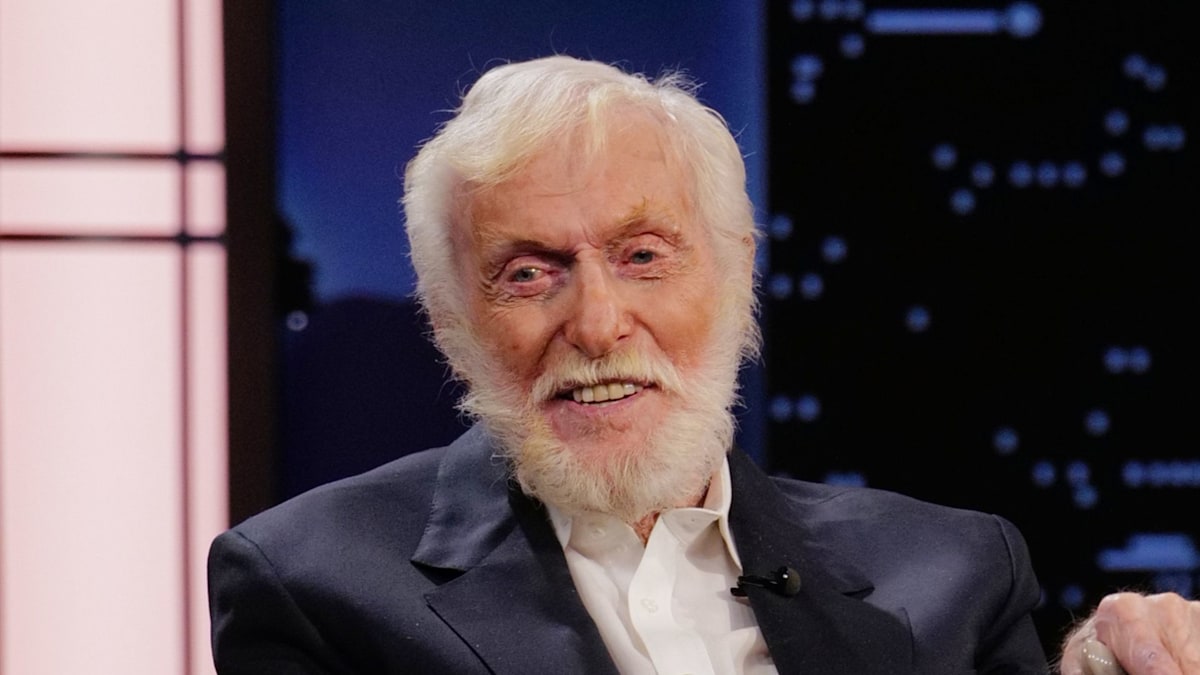FAMU Law’s Economic Justice Clinic Provides Free Legal Services in Central Florida

ORLANDO, Fla. – The Florida A&M University (FAMU) College of Law’s Economic Justice Clinic (EJC) is expanding legal access for underserved communities in Central Florida, providing
essential pro bono transactional legal services such as estate planning, business
law assistance, and nonprofit formation. Led by dedicated faculty and students, the
clinic operates like a law firm, ensuring individuals and small business owners receive
the legal guidance needed to protect their assets and sustain generational wealth.
Recently, the EJC partnered with the Washington Shores Neighborhood Association to
host an estate planning workshop to educate community members about the importance
of preserving generational wealth. Attorney Andrea Small, a practitioner-in-residence at the FAMU College of Law, emphasized the significance
of Heirs’ property—land passed down without a clear legal title—and its impact on
financial stability for families.
 Attorney Andrea Small educates community memebers about the importance of preserving
Attorney Andrea Small educates community memebers about the importance of preserving
generational wealth. (Photo special to FAMU)
“With the rapid gentrification happening in many historically Black communities, it
is vital that residents understand how to protect their assets and ensure their legacy
remains intact,” said Small. “Many people don’t realize the importance of having a
will or a power of attorney until it’s too late.”
Held at the City of Orlando’s Dr. James R Smith Neighborhood Center, the event featured
more than 50 community members, who engaged in discussions about estate planning and
understanding legal documents such as wills, living wills, and powers of attorney.
Participants received intake forms to assess their assets and document their wishes
regarding property, finances, and healthcare. Those interested were invited to follow
up with the Economic Justice Clinic for assistance in formalizing their plans with
help from law students, clinic faculty, and volunteer lawyers.
 FAMU College of Law’s Economic Justice Clinic (EJC) is expanding legal access for underserved communities in Central Florida. (Photo
FAMU College of Law’s Economic Justice Clinic (EJC) is expanding legal access for underserved communities in Central Florida. (Photo
special to FAMU)
Clay Rivers, immediate past president of the Washington Shores Neighborhood Association,
praised the clinic for its dedication and impact.
“On behalf of the Association, I’d like to thank the Economic Justice Clinic for making
the Estate Planning Workshop a complete and total success!” said Rivers. “It was a
long time coming, but it was more than worth the wait. And everyone raved about how
informative and accessible the material was.”
Expanding Legal Services and Community Engagement
The clinic’s broader mission is to bridge the gap between legal services and communities
that might not otherwise have access to those resources. Under the leadership of Professor Mark Dorosin, the clinic has expanded its reach to offer legal support for underrepresented entrepreneurs,
business owners, and nonprofit organizations.
“Our goal is to create additional opportunities to connect with communities in Central
Florida and bring awareness to legal concerns that are often overlooked,” said Small.
“By providing these services at no cost, we can empower individuals with the knowledge
they need to make informed decisions.”
The clinic also fosters mentorship opportunities for law students committed to community
engagement. Economic Justice Fellows work directly with clients, gaining invaluable
hands-on experience for future careers in public interest law, pro bono legal services,
and community-based social justice advocacy.
Each semester, the EJC Fellows, under faculty supervision, assist clients with business
organization and formation, tax exemption application and compliance, regulatory issues,
contract drafting and negotiation, employment issues, financing, public policy advocacy,
and public outreach. In addition to leading community workshops, students recently
supported a Heirs’ Property Symposium hosted by the FAMU Law Review and co-sponsored
by BankUnited. The symposium convened law students, legal experts, and community partners
to discuss land ownership, generational wealth, and property rights.
 Under the leadership of Professor Mark Dorosin, the Economic Justice Clinic has expanded its reach to offer legal support for underrepresented entrepreneurs,
Under the leadership of Professor Mark Dorosin, the Economic Justice Clinic has expanded its reach to offer legal support for underrepresented entrepreneurs,
business owners, and nonprofit organizations. (Photo special to FAMU)
Third-year law student Jasmine Harmon, an Economic Justice Clinic Fellow, reflected
on her experience participating in the Heirs’ Property Symposium workshop.
“I had the privilege of attending the Heirs’ Property Symposium workshop alongside
Professor Dorosin, Attorney Small, and my fellow Economic Justice Fellows,” said Harmon.
“It was the first time I witnessed the Black Letter law I studied in law school come
to life and applied in real-time to support community members through pro bono work.
The experience was both powerful and humbling, as I helped educate the community on
the importance of estate planning while also learning from their personal stories
and diverse walks of life.”
Strengthening Partnerships for Greater Impact
The clinic has strengthened partnerships with organizations such as the H.E.L.P. Community
Development Corporation, Community Legal Services of Central Florida, and Legal Services
of Greater Miami. Through these collaborations, law students provide legal support
to Eatonville and Liberty City residents, helping them prevent Heir’s property issues
and secure their land rights. This work is funded through a grant from BankUnited,
which funds student fellowships and community outreach efforts.
“Our partnerships are essential in expanding our reach and ensuring communities receive
the legal support they need,” said Dorosin. “Through collaborative efforts, we can
make a lasting impact on individuals and families facing complex legal challenges.”
Overcoming Challenges and Looking Ahead
As government policies evolve and funding sources fluctuate, the clinic remains committed
to adapting and responding to the needs of minority business owners and financially
disadvantaged individuals. Small emphasized the importance of staying informed about
policy changes and equipping clients with the resources needed to navigate shifting
legal landscapes.
The role of an EJC Fellow is to help navigate these changes and provide the needed
support for success.
“By continuing its legal advocacy and community engagement mission, the FAMU Law Economic
Justice Clinic ensures that legal empowerment remains accessible to all, making a
lasting difference in the lives of Central Florida residents,” said Cecil Howard,
interim dean at the FAMU College of Law.
How to Seek Assistance
The Economic Justice Clinic serves individuals and business owners who cannot afford
traditional legal counsel. Those interested in receiving assistance can contact Professor
Mark Dorosin at (407) 245-4000 or email the clinic at [email protected] for further information.
Back to Stories
link








